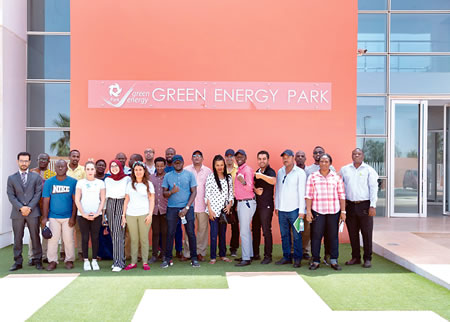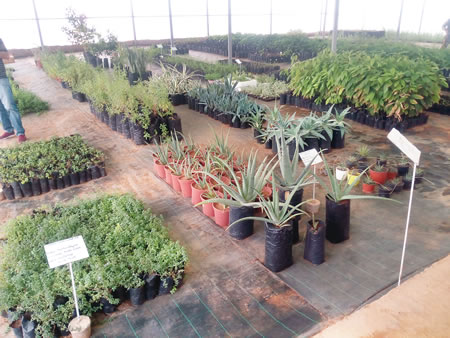
Recently, a company renown as the largest producer of fertiliser in the world, Office Cherifien des Phosphate (OCP) which has its base in Morocco, invited journalists from some African countries on a tour of its installations and briefing on how it intends to ensure food security for the ever- increasing world population. NURUDEEN ALIMI was among the invited journalists, and gives a wrap-up of the one-week trip.
Sustainable agriculture is farmers’ ability for producing food without affecting the environment as well as the surrounding ecosystem.
There are a few issues which are connected to agriculture and one of them is the biophysical issue. It is linked with activities like fertilizer usage, use of artificial nutrients and crop rotation along with the availability of resources like sunlight, water and wind.
While all these factors are equally important for plant growth, fertilizers are given extra importance, as they are the ones that help plants in the initial stages of growth. Fertilizers are materials of synthetic or natural origin which are applied to the plant tissues or soil for supplying plant nutrients crucial to plant growth. Fertilizers are meant for enhancing plant growth.
Today there are advanced fertilizer formulas that deliver the same productivity and yield improvements, while limiting the potential downsides of fertilizers, including phosphates, on the environment.
They are encompassed in the concept of the “evergreen” agricultural revolution, which has allowed for increased yields while respecting ecosystems and the environment.
This practice of sustainable agriculture is built on the premise of “the right dose of fertilizer in the right place, at the right time” and has helped decrease the use of chemical fertilizers since 1990, for example, by 20 percent over ten years in France.
For OCP, the impact of increased efficiency of fertilizer use will help us sustainably meet the increased demand for fertilizer due to population growth, the requirements for global food security and the growing demand of the bio-fuel industry.
In a bid to showcase what it is offering and still has to offer the African and the world agricultural market, OCP, a world-leading fertilizer production company in Morocco, invited 17 journalists from different African countries to tour its installations across the country from July 29-August 5, 2018.

At the corporate headquarters of the company in Casablanca, which is the business hub of Morocco, the Managing Director, OCP, Mustapha El Ouafi, told the team of journalists that the activities of the company is from earth to earth.
“We are taking phosphate from the soil in mines and prepare it for the earth to feed the plant. And all the preparation we are doing is to arrange the phosphorate in adequate concentration and adequate form to be available to the plant.
“The plant are nourished by three major nutrients which are: Nitrogen, phosphate and potassium to grow.
Our activities here in OCP is mainly about mining phosphate, but we combine these three major elements to produce fertilizer for the plant”.
El Ouafi, informed that the difference between the three elements is that one is a chemical that is Nitrogen while phosphorate and potassium are minerals of which are natural products.
He said the need for fertilizer became imperative because the world population is growing very fast and the arable land available to mankind per capital is diminishing.
“We have less arable land to feed the growing population and the only way to solve this problem is to increase the yield from the available arable land. Yield increase can happen by using different technologies. but it depend mainly by giving fertilizers to the plant”.
With access to one of the largest reserves of phosphates in the world, the OCP Group is strategically important to the Moroccan economy and has taken a leading role in the country’s industrialisation and supported the government’s desire to build trading and investment relationship with sub-Saharan Africa.
Its most efficient fertiliser is made of a combination of nitrogen, phosphate and potassium which OCP has mastered thanks to its almost a hundred statuses as one of the leading exporters of phosphates in the world.
Given the state of agriculture development in Nigeria, the Managing Director, OCP Group, Mr Mustapha El Quafi said there was need for exchange of knowledge and technology transfer.
El Quafi explained that the company started as a government mining company exploring the country’s rich phosphate depositsh as evolved to become a vertically-integrated agriculture company, moving up the value chain into manufacturing and distribution of fertiliser.
The Managing Director attributed OCP’s global reputation to an expanding global population and an increasing demand for phosphate and other products.
He said Morocco is doing well in agriculture and has developed great expertise in fertiliser and solar technologies.
Employment in agriculture represents an important percentage of total employment. The government through OCP has used its phosphates to boost its agricultural productivity.
Morocco has the largest deposits of phosphate in the world with reserves that can be exploited the next 700 years.
OCP Group is the company saddled with the responsibility of ensuring that the Kingdom of Morocco continues with its phosphate mining and fertilizer production to achieve its vision of ensuring that the soil is fed in order to feed Africa and the entire planet.
Almost a century, 1920 to be precise when OCP started its mining work in Morocco, the company had gone through various level of transformation. Currently, the main focus of the OCP Group, is to produce a wide range of phosphate-based products to meet specific needs of cultures and livestock around the globe, produce high quality and soil-specific fertilizers based on research to feed farms all over the world to boost food production.
OCP Group has a three-phased production links that rely solely on the use of advanced technology. The first one is the raw material, phosphate, which is extracted from the mine located in Khouribga, a town in the south-west part of Morocco.
The raw material is then transported through pipelines to the industrial facilities also located in Khouribga for thorough washing.
After the whole process is completed, the washed phosphate product is therefore transported through a world-class underground 200 kilometer pipeline from the Khouribga facility to the Jorf Lasfar processing plant where it will be processed into Fertilizer and series ofphosphate-based products and derivatives for local use and for international exports.

OCP’s green energy park situated in the city of Benguerir is the first if its kind in Africa. The park’s major role is to mutualize resources, create synergies and position Morocco as a leader in the innovation of renewable energies. The $25 Million Dollar pilot project involves developing scientific research, optimising the exploitation of Morocco’s natural resources, preserving it’s environment, sustaining it’s economic and social development and ensuring a secured future for the next generation.
The Green Energy Park structured on an eight-hectare land, has an internal research platform of over 3,000 square meters that integrates several laboratories within solar photovoltaic and solar thermal areas.
OCP has a tree planting policy. After it has completed the exploitation of a particular land space, The next line of action is to plant trees that are capable of growing in the climatic zone such as Olives, Argan, Quercus ilex, Cypresses Atlantic and Mastic tree. The team of Journalists who were on the tour were privileged to plant trees as it has become a tradition.
The launch of OCP Africa
In 2016, OCP Group announced the creation of OCP Africa to meet the challenge of creating structured efficient and sustainable agricultural development across the continent.
A fertilizer production complex, Africa Fertilizer Complex (AFC) was inaugurated in February 2016 in Morocco by His Majesty, King Mohammed VI.
The aim is to ensure the growth of the continent’s market through a continuous and regular supply of fertilizer.
The plant consists of a sulfuric acid unit which produces 1.4 million metric tonnes per year, a phosphoric acid unit with production of 450,000 tonnes annually, fertilizer production unit with the capacity of 1 million tonnes annually; 62 MW thermo electric power plants and a storage infrastructure with a capacity of 200, 00 metric tonnes.
After the launch of the Africa Fertilizer Complex by March the same year, the group established nine subsidiaries in Nigeria, Benin, Senegal, Cameroon, Cote d’ Ivoire, Tanzania, Zambia, Ghana and Kenya. OCP has extended its presence to Rwanda, Mozambique and Ethiopia.
Since venturing into sub-Saharan markets in 2016, OCP has signed numerous contracts with private and public shareholders, trained and introduced thousands of farmers to the efficient use of fertiliser around Africa, helped various governments in their national agricultural caravans and heavily invested in agricultural –oriented research.
The company signed an agreement with the Ethiopian government to build a world -class fertiliser plan t by 2012 with a capacity of 2.5 million tonnes per year, to reach 3.8 million metric tonnes in the near future.
Meeting the demands for fertilizer in Africa
The Managing Director, OCP Group, Mustapha El Ouafi, noted that the company is making tremendous efforts to meet the strong demand of African countries for fertilizer.
According to him, the group has mapped out demand in African partner countries and will attend to it wherever it is found.
Quafi said the company is counting on raising demand for fertiliser on the international market.
Analysts expect strong demand to be between 12 and 14 million additional tonnes by 2027.

In its ambition of capturing 50 per cent of global demand by 2027, OCP sees Nigeria as one of the most important consumers of fertiliser in the continent.
Strengthening the technical and scientific capacities of small scale farmers
As part of its strategies, OCP put together agricultural mechanisms in host countries to strengthen the technical and scientific capacities of small farmers to observe good agricultural practices.
The Head of Mission to the Secretary General, Mohammed VI Polytechnic University, a world –class institution sponsored by OCP, Khalid Baddou said the institution is focused on tackling industrialisation, and food production challenges and it is prepared to assist Nigeria build capacities in fertiliser production.
According to him, the industry employs sophisticated technologies in fertiliser production and the operation and maintenance of fertiliser plants require skills of the highest order.
OCP/Nigeria relationship
Indeed, the various agreements between the Federal Government and Morocco are yielding effective results for both countries that set a model of a sub-Saharan cooperation that is also a win-win partnership.
Morocco and Nigeria signed three cooperation agreements, including an agreement for a strategic Morocco-Nigeria gas pipeline, during the visit of President Muhammad Buhari.
The 5,600 kilometric pipelines will give Africa a new economic, political and strategic dimension and place both countries as two leaders of south-South cooperation.
Another agreement was a Memorandum of Understanding between the OCP Group and the Nigeria Sovereign Investment Authority (NSIA) for the development of an industrial platform for the production of ammonia and related products.
There is also a cooperation agreement in the field of agricultural vocational training and technical supervision between the agriculture ministries of the both countries for the joint development of agriculture and fisheries in Western Africa.
The group has signed an agreement with Dangote for the construction of a fertiliser production platform which will be powered by gas from Nigeria and phosphate provided by OCP.
Bauchi State Governor, Mohammed Abubakar, during a visit to King Mohammed VI Polytechnic University, Ben Guerir, Morocco, sought and got consent for the building of a new fertilizer plant in the state.
Over 30,000 farmers are to benefit from the Bauchi State government collaboration with OCP Africa School Project that involves instant mobile soil analysis to determine the suitable fertiliser to be used by farmers to increase yield.
Bauchi State Government along with three other states entered into an agreement with OCP Africa for the school laboratory project.
Synergy with Nigerian stakeholders
In 2016, OCP and the Fertilizer Producers and Suppliers Association of Nigeria (FEPSAN) signed a Memorandum of Understanding to strengthen Nigeria’s agriculture industry.
The MoU was signed in Abuja in the presence of King Mohammed VI and President Muhammad Buhari.
The MoU details contributions to the Nigerian agricultural sector through the supply of fertiliser which are adapted to local oils and crops, while ensuring farmers’ access to continuous fertiliser supply.
The collaboration between OCP Group and FEPSAN covers a large array of issues relevant to the agricultural sector.
These include the implementation of fertilising solutions which can adapt to the soils and crops, market supply of fertiliser and support for local farmers.
WATCH TOP VIDEOS FROM NIGERIAN TRIBUNE TV
- Let’s Talk About SELF-AWARENESS
- Is Your Confidence Mistaken for Pride? Let’s talk about it
- Is Etiquette About Perfection…Or Just Not Being Rude?
- Top Psychologist Reveal 3 Signs You’re Struggling With Imposter Syndrome
- Do You Pick Up Work-Related Calls at Midnight or Never? Let’s Talk About Boundaries





